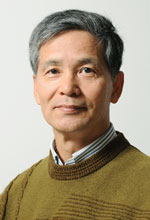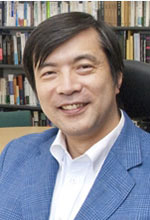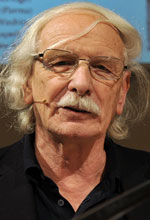
What is uniquely human? Where did we come from? How did we get here? These questions all address the evolutionary origins of human nature. However, brain and mind are not preserved in the fossil record. Chimpanzees, our closest evolutionary relatives, can provide clues to understanding the evolution of the human mind. I have been studying chimpanzees both in the wild and in the laboratory. This talk will use evidence from these parallel lines of work to provide an evolutionary scenario for the uniqueness of the human mind, focusing on socio-cognitive development in humans and chimpanzees. The model I propose has four stages. The initial stage is characterized by the innate mother-infant interaction. The second stage involves co-action such as co-feeding or action synchronization. The third stage is marked by imitation, in which the individual tries to copy a model. Imitation is ubiquitous in humans, but scarce in nonhuman animals. The imitative process results in an experience that is identical to the model's. This provides the basis for the fourth stage, in which we begin to exhibit a unique mental capability: understanding others' minds. This final stage also implies enhanced imagination and inference. Based on current events, we can imagine events separated from us in space and time. This may lead to the establishment of a theory of mind, as well as symbolic, representational, and linguistic capabilities.

Hominin evolution has involved a continuous process of addition of new kinds of cognitive capacity, including those relating to manufacture and use of tools and to the establishment of linguistic faculties. The dramatic expansion of the brain that accompanied additions of new functional areas would have supported such continuous evolution. Extended brain functions would have driven rapid and drastic changes in the hominin ecological niche, which in turn demanded further brain resources to adapt to it. In this way, humans have constructed a novel niche in each of the ecological, cognitive and neural domains, whose interactions accelerated their individual evolution through a process of triadic niche construction. Human higher cognitive activity can therefore be viewed holistically as one component in a terrestrial ecosystem. The brain’s functional characteristics seem to play a key role in this triadic interaction. We advance a speculative argument about the origins of its neurobiological mechanisms, as an extension of the evolutionary principles of adaptive function in the animal nervous system. The brain mechanisms that subserve tool use may bridge the gap, with the site of such integration being the parietal and adjacent cortices.

Homo homini lupus - "man is wolf to man" - is an old Roman proverb popularized by Thomas Hobbes. Even though it permeates large parts of law, economics, and political science, the proverb fails to do justice to our species' thoroughly social nature as well as to canids, which are among the most gregarious and cooperative animals. For the past quarter century, this cynical view has also been promoted by an influential school of biology, but Charles Darwin himself saw things differently. He believed in continuity between animal social instincts and human morality. Modern psychology and neuroscience support Darwin's view about the moral emotions.
In this lecture, the acclaimed author of The Age of Empathy (2009) shows how empathy comes naturally to a great variety of animals, including humans. In his work with monkeys and apes, de Waal has found many cases of one individual coming to another's rescue in a fight, putting an arm around a previous victim of attack, or other emotional responses to the distress of others. By studying social behaviors in animals, such as bonding, the herd instinct, the forming of trusting alliances, expressions of consolation, and conflict resolution, de Waal demonstrates that animals -and humans -are preprogrammed to reach out, questioning the assumption that humans are inherently selfish. He argues that understanding empathy's survival value in evolution can help to build a more just society based on a more accurate view of human nature.

This year is the 20th anniversary of the finding of mirror neuron in macaques. In the present talk I discuss the relevance of the mirror mechanism for our sense of self and our sense of others. By providing us with an understanding from the inside of actions, the mirror mechanism radically challenges the traditional view of the self and of the others. Indeed, this mechanism not only reveals the common ground on the basis of which we become aware of ourselves as selves distinct from other selves, but also sheds new light on the content of our self and other experience, showing that we primarily experience ourselves and the others in terms of our own and of their motor possibilities respectively.
Professor Giacomo Rizzolatti (University of Parma, Italy) was not able to come to Japan because of his health condition.